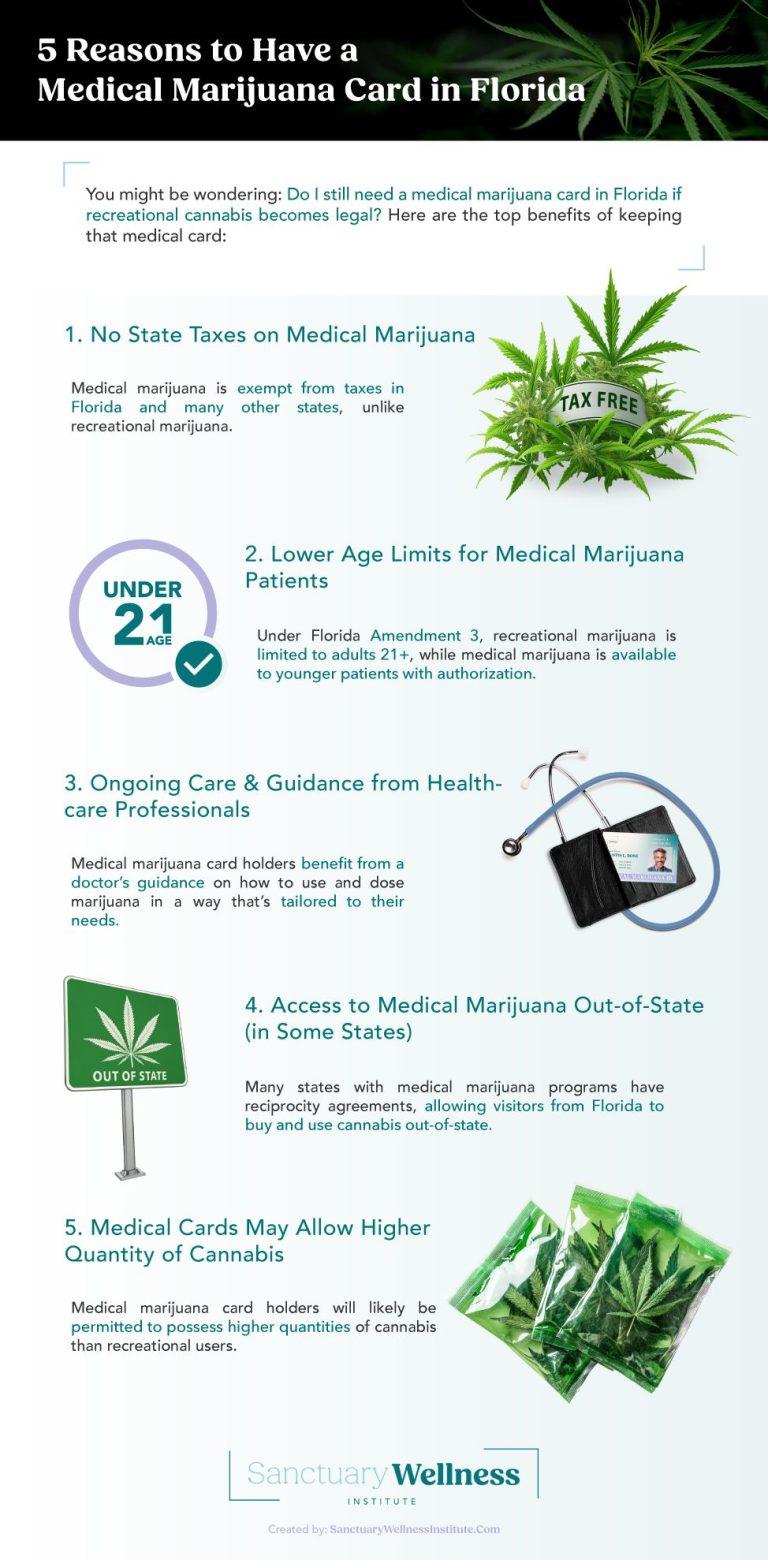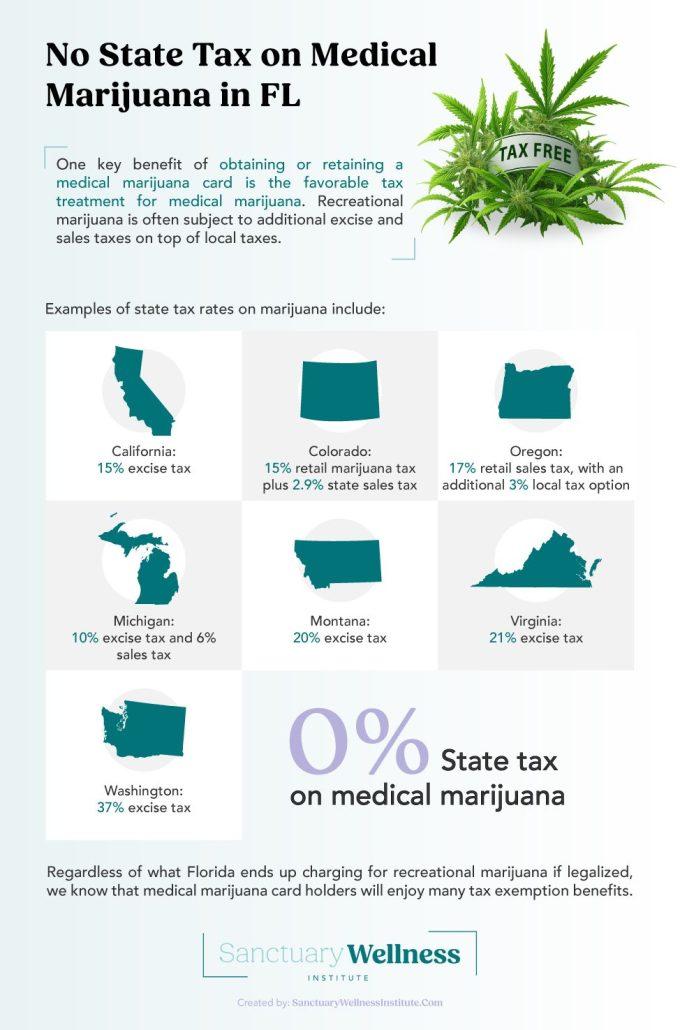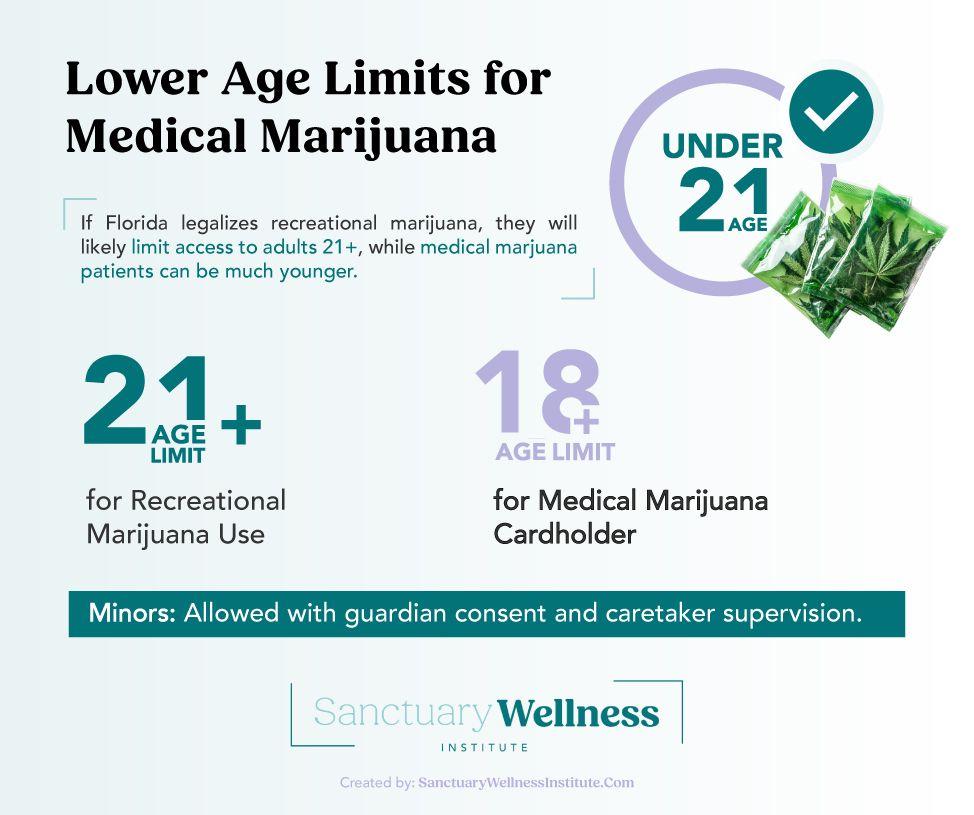Benefits of Having a Medical Marijuana Card in Florida
- Wafa Azeem
- Published: September 12, 2024
- Updated: November 19, 2024
- Fact-checked by Allison Marr

Amendment 3 (the Marijuana Legalization Initiative) on the upcoming Florida ballot will determine the legality of recreational marijuana in the state. Recent polls show strong support, with a significant majority favoring legalization. This raises questions for medical marijuana patients about whether medical cards will become obsolete or remain useful should the measure pass.
At The Sanctuary Wellness Institute, we have the answers to all your medical marijuana questions. No matter how the vote turns out in November, our medical marijuana doctors and wellness team are here to provide the information you need to make informed decisions about your health.
Do I still need a medical marijuana card if recreational cannabis becomes legal?
If you qualify for medical marijuana use, we recommend keeping your card or even obtaining one. Even if Amendment 3 passes, there are many benefits to having a card, including tax exemption, professional guidance from a healthcare provider, and more.
In July 2024, we surveyed our Florida medical marijuana patients and found that 80% of them still plan on using and obtaining medical marijuana cards even if recreational marijuana becomes legalized. However, only 66% said they knew the benefits of keeping their card. Let’s go over some of the main benefits of keeping that medical card.

Top Reasons to Have a Medical Marijuana Card in Florida
For Florida residents, obtaining a medical marijuana card offers a range of benefits that can significantly enhance quality of life. From accessing a wider variety of medical cannabis products to enjoying legal protections and personalized care, having a medical marijuana card provides numerous advantages tailored to individual health needs. In this guide, we explore the top reasons why obtaining a medical marijuana card in Florida can be a pivotal step towards better health and well-being.
1. No State Taxes on Medical Marijuana
One key benefit of obtaining or retaining a medical marijuana card is the favorable tax treatment for medical marijuana. In Florida and many other states, medical marijuana is exempt from taxes, unlike recreational marijuana, which is often subject to additional excise and sales taxes on top of local taxes.
While we don’t know how Florida will tax recreational cannabis if legalized, we do know what other states with legalized recreational marijuana charge. These states often have varying tax rates on cannabis sales, including percentage-of-price taxes, weight-based taxes, and potency-based taxes.
Examples of state tax rates on marijuana include:
- California: 15% excise tax
- Colorado: 15% retail marijuana tax plus 2.9% state sales tax
- Oregon: 17% retail sales tax, with an additional 3% local tax option
- Michigan: 10% excise tax and 6% sales tax
- Montana: 20% excise tax
- Virginia: 21% excise tax
- Washington: 37% excise tax
Regardless of what Florida ends up charging, medical marijuana card holders can enjoy many tax exemption benefits with their medical cards.

2. Lower Age Limits for Medical Marijuana Patients
While recreational marijuana use in Florida may be limited to adults 21 and older if legalized, medical marijuana patients can access treatment at a younger age with proper authorization. Anyone 18 years and older may apply for a medical marijuana card in Florida, while minors can qualify under the supervision of an approved medical marijuana caregiver.
Florida requires caregivers to be state residents aged 21 or older, complete certification every two years, pass background checks, and carry proper ID when handling marijuana. This system allows minor patients with qualifying conditions to receive necessary treatment under the supervision of a responsible adult, ensuring safe and compliant access to medical marijuana for those who need it, regardless of age.

3. Ongoing Care & Guidance from Healthcare Professionals
Medical marijuana card holders benefit from ongoing professional care and guidance. Determining things like the right dosage and strain can be tricky. For example, many people don’t know the difference between sativa and indica, whether cannabis is better smoked or ingested, or how to enjoy cannabis without a high.
Part of the medical marijuana process involves seeing a provider every 7 months. Talking to a doctor allows you to discuss specific ailments and come up with treatment plans tailored to your needs. It takes the guesswork out of cannabis care and can help prevent misuse.
4. Access to Medical Marijuana Out-of-State (in Some States)
Having a medical marijuana card can provide peace of mind and ensure uninterrupted care when you travel or spend extended periods out of state. While policies vary, several states with medical marijuana programs have reciprocity agreements, allowing visitors to purchase and use medical cannabis within their borders. Users without a card do not have this privilege and are limited to states where recreational marijuana is legal.
For further information on this topic, read “Which U.S. States Accept Out-of-State Medical Marijuana Cards?” to learn more.
5. Medical Cards May Allow Higher Quantity of Cannabis
Medical marijuana card holders will likely be permitted to possess higher quantities of cannabis than recreational users. While the proposed Amendment 3 would allow recreational users to possess up to three ounces (3 oz) of marijuana and five grams (5 g) of concentrate, medical marijuana patients currently enjoy more generous allowances. Medical marijuana patients are allowed to possess up to four ounces (4 oz) of smokable cannabis at a time, with a purchase limit of 2.5 ounces (2.5 oz) within any rolling 35-day period.
Additionally, qualified physicians can issue certifications for up to three 70-day supply limits of non-smokable medical cannabis or up to six 35-day limits of smokable flower. These higher quantity allowances are crucial for patients who require consistent and effective dosing to manage chronic conditions.
As cannabis regulations continue to develop, we anticipate that medical marijuana cardholders will maintain these greater allowances, ensuring they have access to the amount of cannabis necessary for their health and well-being.
Other Potential Benefits
While we don’t yet know all the ramifications of Florida legalizing recreational marijuana, we anticipate several other reasons why medical marijuana patients should keep their medical cards. In addition to the advantages listed above, here are some potential benefits we predict for medical marijuana cardholders compared to recreational cannabis purchasers:
- Home Delivery: Although Amendment 3 doesn’t say anything about home delivery for recreational marijuana, our best guess is that only medical marijuana patients will continue to enjoy this perk from dispensaries that offer delivery.
- Higher Potency Allowance: We know that medicinal users may not exceed 24,500 mg of THC in a 70 day period, but no information has been provided yet for potency allowances for recreational use. We predict that recreational users will not be permitted the same potency as medical users.
- Medical-Only Cannabis Dispensaries: We anticipate some dispensaries becoming exclusive to medical patients only. Currently we are waiting on the state to see if they will allow medical and recreational products in the same dispensaries, or if they will require separate stores. If they do require separate, this could be good news for medical card holders by giving them an exclusive experience apart from the wider crowd.
Conclusion
Much will be determined by November’s election results, but one thing that won’t change is the benefit of having a medical marijuana card in Florida. Regardless of the outcome of Amendment 3, maintaining a medical card will continue to offer invaluable advantages that enhance the quality and effectiveness of cannabis treatment and your overall health.
Get Your Florida Medical Marijuana Card with the Sanctuary
At The Sanctuary, we simplify obtaining your Florida medical marijuana card. You can start the process by scheduling an in-person appointment with one of our licensed medical marijuana doctors. During the appointment, the doctor will evaluate your health to determine if you have a qualifying condition. If eligible, your information will be entered into the Medical Marijuana Use Registry (MMUR). You’ll then receive an email from the state with instructions to apply for your medical marijuana card online or by mail, where you’ll need to provide proof of residency, a passport-style photo, and a small fee. After that, all you have to do is wait for your card to arrive in the mail!
We’re here to help you every step of the way, so call or make an appointment online!
Areas Where We Offer Medical Marijuana Card Services
How we reviewed this article:
- Recreational Marijuana Taxes by State, 2023
https://taxfoundation.org/data/all/state/state-recreational-marijuana-taxes-2023/ - Medical cannabis and sales tax, explained
https://www.taxjar.com/blog/medical/medical-cannabis-sales-tax - Caregivers
https://knowthefactsmmj.com/caregivers/ - 64ER22-8 Dosing and Supply Limits for Medical Marijuana
https://knowthefactsmmj.com/wp-content/uploads/2022/08/64ER22-8-Dosing-and-Supply-Limits-for-Medical-Marijuana.pdf
Current Version
September 12, 2024
Written By
Wafa Azeem
Fact-checked By
Allison Marr
Editorial Process
Our Editorial Process

Wafa Azeem holds a bachelor’s degree in English from the University of California, Los Angeles, and a master’s degree from California State University, Northridge. With over 10 years of copywriting experience, she has been contributing to the Sanctuary Wellness Institute since 2024.







